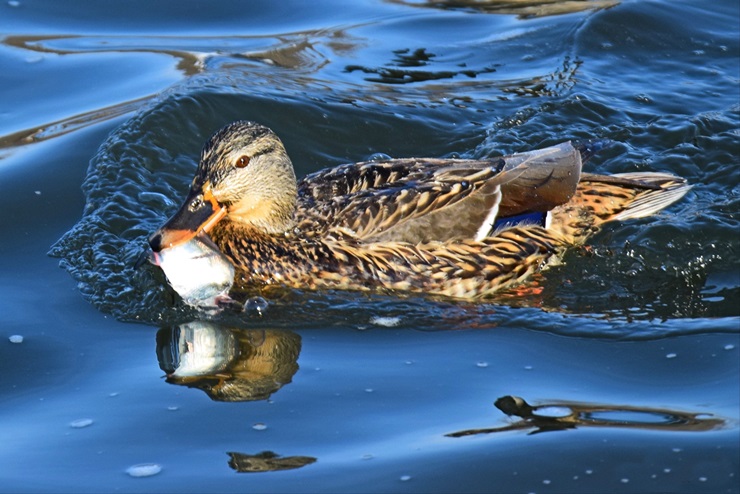There’s one thing we know for sure – ducks definitely enjoy eating seeds! But what else do they eat in the wild? Since they’re primarily aquatic birds and spend most of their time in the water, do they feed on fish species? We’ve noticed they often completely submerge under the water for feeding. Sea ducks and diving ducks are the ones that submerge the deepest for foraging. So what exactly are they looking for under the water?
The answer to today’s question is that ducks do feed on fish! However, this highly depends on their feeding habits and how adapted they are to going underwater for foraging.
That’s why we’ll try to discuss a duck’s feeding behavior and understand whether fish are a constant in their diet or not. Moreover, we’ll tell you whether domesticated ducks eat fish just as often as wild ducks.
Do Ducks Eat Fish?
Ducks are omnivores and primarily eat aquatic plants, grasses, insects, worms, small mollusks, and small amphibians. Sometimes, however, they also prey on fish and fish eggs. On the other hand, this isn’t true for all duck species.
Dabbling ducks, for example, feed only on the water surface and on land. On rare occasions, they submerge underwater to look for food, only as long as they don’t submerge completely.
By contrast, diving ducks and sea ducks feed almost exclusively underwater. The former, for instance, find it easier than dubbing ducks to submerge because they’re heavier than their counterpart.
Other duck types go beyond preying on small, regular fish and choose larger species. We’re talking about typical mergansers. These ducks’ long, thin bills have serrated edges that are of great help in catching large fish.
Here’s what fish mergansers will eat if they have the chance:
- Salmon
- Trout
- Minnows
- Sunfish
- Eels.
Still, most ducks won’t have fish as a primary food source.

Do Mallard Ducks Eat Fish?
Like other duck species, mallards are omnivores and eat various foods. Their diet may depend on food availability, competition, and the breeding cycle stage. For instance, during the breeding season, male mallards and non-laying females primarily eat plant matter and supply their diet with animal matter. Laying females, on the other hand, eat mostly animal matter.
As a general rule, a mallard’s diet primarily consists of insects, gastropods, crustaceans, worms, and arthropods. Sometimes they eat roots and tubers.
Therefore, we can conclude that mallards don’t often eat fish. But when they do, they’ll go for small species.
Do Ducklings Eat Fish?
Wild ducklings certainly learn and adapt to eating fish. Domesticated ducks most often grow on a duck pellet diet packed with everything they need for proper growth.
While it isn’t forbidden to feed them fish, they may find it difficult to swallow and digest the food. However, once they mature and you’re sure they’ve grown up healthy and strong, you can start including fish into their diet.
Do Ducks Eat Fish in a Pond?
Of course! They’ll delight in the fish kept in your pond. If this is a positive or a negative aspect depends on whether you’re trying to avoid this or to introduce fish into your ducks’ diet. If it’s the former, we recommend using netting to discourage the birds from entering the pond. If it’s the latter, you don’t have to worry; it won’t take long for your ducks to get used to eating fish, especially since catching them in a pond is pretty easy, as long as they aren’t too large!
However, there’s one thing you should be aware of. Fish contain parasites that can make your ducks sick. Wild ducks are much more resistant to the bacteria found in raw fish. Domestic ducks, though, not so much. If you can avoid your ducks eating raw fish from your pond, they’ll undoubtedly thank you afterward!
Are Fish Beneficial for Ducks?
Fish are an excellent food source for these aquatic birds! First and foremost, fish contain high amounts of Omega-3 fatty acids, which are good additions to a bird’s diet. They have anti-inflammatory properties, prevent various diseases, and boost the immune system.
Fish contain vitamins and minerals, too. Calcium, for example, is essential to a duck’s body and plays a crucial role in producing strong eggshells. Vitamin D and Phosphorus are other beneficial components in fish that sustain good health.
On the other hand, some fish contain high amounts of mercury, which can accumulate in your ducks’ bodies over time and cause more harm than good. Some of these are swordfish, mackerel, and tuna.
Besides, while wild ducks have adapted to ingesting fish bones and shells of crustaceans, domesticated ducks can easily choke on bones. It’s generally recommended to feed ducks deboned fish sold at pet stores or regular grocery stores.
How Often Should Ducks Eat Fish?
While fish is an excellent addition to your ducks’ diet, you should only offer it to your waterfowls as an occasional treat. Some ducks showed indigestion upon eating too much fish. Moreover, if fish are part of a daily diet, the risk of one of your ducks choking on bones is much higher. It’s generally recommended for domesticated ducks to eat fish once or twice a week.
